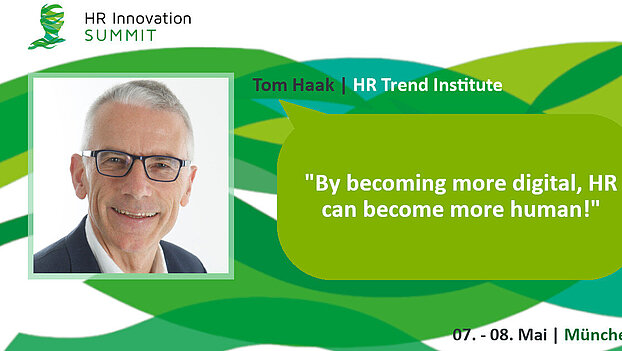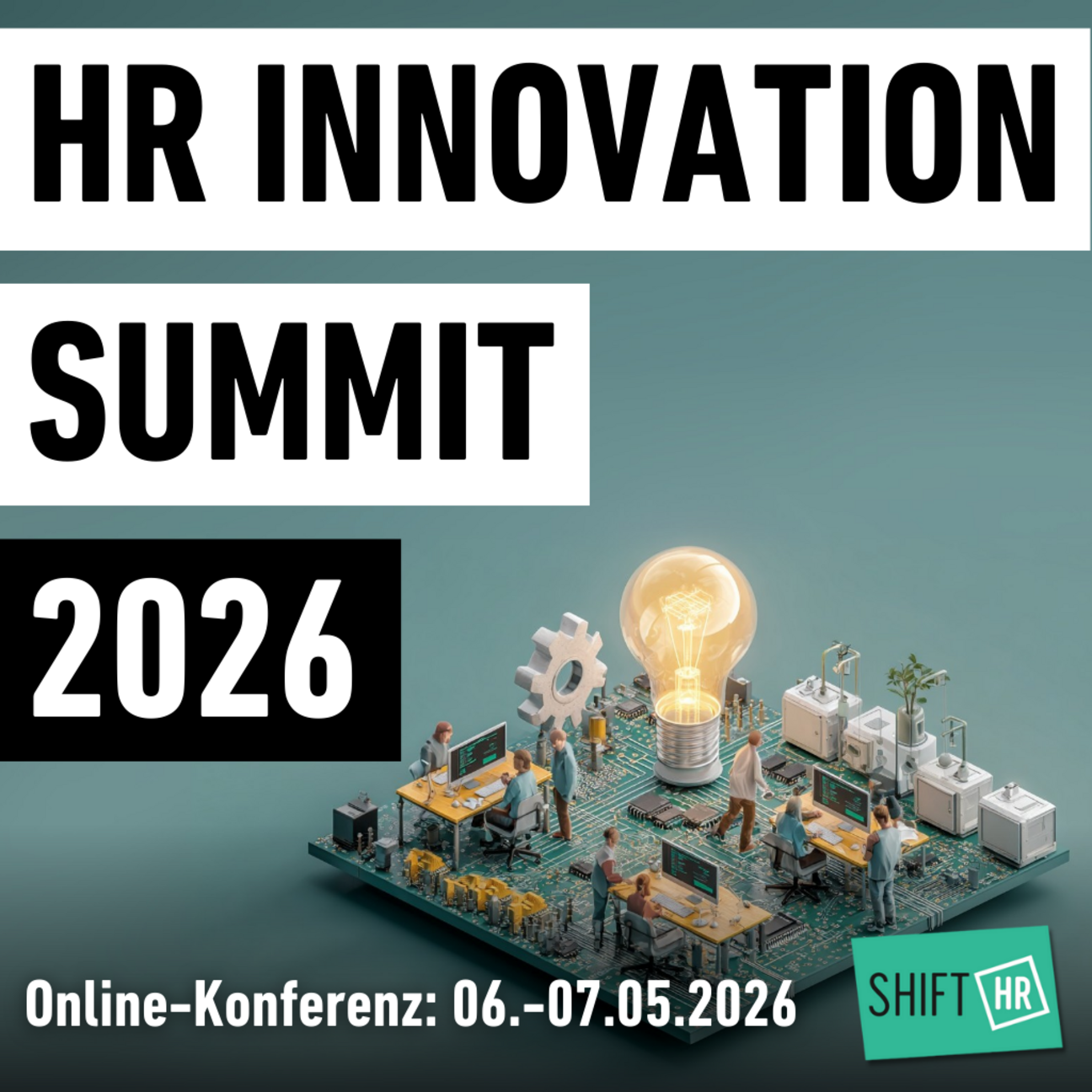
As the HR Innovation SUMMIT 2019 is approaching, it is time to start with the first interviews in our blog. This year, the focus is on employee experience, talent empowerment and people analytics. A variety of experts from all fields will talk about their own experiences and the latest trends in HR. We always interview some of these speakers in advance to prepare you for the event and give you some food for thought. Like usual, we have already published some articles and also the articles written for the last HR Innovation SUMMIT are not outdated yet. Therefore, it is always a good idea to look through the already existing content in our Blog. Tom Haak is the director of the HR Trend Institute. The HR (Human Resources) Trend Institute follows, detects and encourages trends in the people and organization domain and in related areas. Where possible, the institute is also a trend setter. Tom is considered to be one of the leading global HR thought leaders. Tom has an extensive experience in HR Management in multinational companies. He worked in senior HR positions at Fugro, Arcadis, Aon, KPMG and Philips Electronics. Tom has a keen interest in innovative HR, HR tech and how organizations can benefit from trend shifts. He answered for us the following questions in an interview:
1) Tom - you will be again giving a keynote at HR Innovation SUMMIT about the trends that you are seeing in HR. What are the hashtags that we can mark your talk with?
#hrtrends #personalization #highimpacthr #fun Life in and around organizations can be a lot more fun, a lot more rewarding and a lot more effective. My mission is to inspire people, leaders and HR professionals with my views, insights and by sharing nice examples. By using the current trends and by using HR technology, HR can increase its impact enormously.
2) For the HR Innovation SUMMIT, we are discussing the overall experiences on the way to a digital HR management. How do you judge the overall efforts to become more digital in HR?
On the positive side: We have seen a lot of change in the last years. More negative: The transformation is going rather slow. In my view, many organizations still take very much a traditional top-down approach. The focus is on the organizational needs, less on the needs and wishes of the employees. Organizations are often still viewed as rather stable pyramids. A clear structure, clear reporting lines and fixed job descriptions. There is a tendency to focus on “getting the basics right”. First, we must get the basics right, then … Getting the basics right can take a very long time, and while you are doing this, the organizations and the market moves on. Installing a big HRIS is often part of “getting the basics right”. The expectations of these big systems are often high. “Once we have implemented system X, we can do almost everything!”. In the meantime, managers and employees are becoming less happy with HR. While working on the basics, there is less focus on the business priorities and less focus on the employees. My advice: start with focusing on the big business issues and determine how HR can contribute. Focus on high impact – low effort interventions. HR tech can help to design creative and innovative high-impact interventions.
3) While becoming digital is the one underlying idea of all HR trends these days - becoming employee centric & first is the second. What is your opinion on the relation of these two?
Becoming more digital and becoming more employee centric can go hand in hand. If organizations investigate the employee experience, they often find certain elements employees (and managers) like to see improved. For example: Employees want quick and easy access to relevant HR information. They lose a lot of time searching the intranet and then finally find a lot of text that is not totally up-to-date. If employees have an HR related question, they want to be able to get a quick answer, 24/7. Applicants are very keen to hear as quick as possible whether they have gone to the next round. If they are hired, they do not want to wait days for their contract. Ease-of-use, speed and transparency are vital. Technology can help a lot to deal with these issues. A real user-friendly employee portal, chatbots that are available 24/7 and service-oriented HR professionals in the call center as a last resort. By becoming more digital, HR can become more human. I talked to someone of Unilever the other day. She was the “People Experience Lead” for a location. At Unilever, HR is going through an interesting transformation. For years the focus has been on HR efficiency. Now it seems to be more on the people. I like it that they call it “people experience” and not “employee experience”.
4) What innovative approaches do you see that combine these two aspects?
There are many examples. I would like to mention two. One is a big American retailer, that annually hires thousands of new people. The have implemented the “virtual job try out”. With people analytics, they have determined the differentiating characteristics of successful employees. Through the online virtual job try out the applicants get a good idea of the employer and of the main elements of the job they are applying for. In the simulation they must complete some tasks (relevant for the job), and in this way they are tested against the main criteria. When they pass the threshold, they are invited for the next round. This is a good example of using technology (people analytics, a virtual experience and advanced gamified testing) to give the candidates a positive experience (fast, fun, relevant) and with a lot of benefits for the employer (speed, more diverse pool of candidates, lower costs of recruitment). The second example comes from a pharmaceutical company. Here they use technology to crowdsource ideas from the employees. A question or challenge is put to the employees. They can submit their ideas in a free format. The software condenses and groups the ideas, and in the second round, the employees can vote on a list of ten ideas (not all employees get the same list). The result: a great list of ideas that can be used to tackle the issue. Not super high tech (although AI is used to make sense of all the submissions and make clever iterations), but very powerful. The employees like it, because, contrary to normal employee surveys, they can really contribute.
5) In many companies, HR is struggling with the administrative role - and not finding time to get the new stuff. What is your recommendation?
Often, the administrative role is mentioned in a way as if it is not very important, and a kind of low-grade work. Strategic is good and administrative is bad! The operational role of HR is very important, and most of the work of HR is in the operational domain. A lot of innovations are possible in this domain. Once upon a time Ulrich and Brockbank wrote about the four roles for HR: strategic partner, change agent, administrative expert and employee champion. For decades most HR professionals wanted to be strategic partners and change agents. Now, finally, we see more attention towards the other two roles. My recommendation: Kind of split HR in two pieces. HR operations and HR advice or HR strategic advice. Most activities and people will be in operations. In HR operations, it is about customer focus, hospitality and efficiency. Make sure that the way HR operations work results in a great candidate, employee and manager experience (or, in fact, a great people experience). Embrace the ”new stuff”, and experiment with new innovative solutions. Unfortunately, HR is always very busy. I think this is often a kind of excuse, like “getting the basics right”. “If we were not so busy, if we would have our basics right, then …”. By more focus, by cleverly using technology, by being less management-oriented, HR can release a lot of time and potential.
6) What are your expectations for coming to the HR Innovation SUMMIT and what are topics you like to discuss and exchange about?
Germany has a strong HR tech and HR innovation community. I always meet very interesting people. At the HR Innovation Day in Leipzig, at Zukunft Personal Europe, and also at the HR Innovation Summit. I am always looking for nice stories, that I can use in my presentations to inspire HR professionals and others around the world. Practical stories, about what works and what not. Currently, I am working on a book (working title “High Impact HR”) and I am looking for good case studies to include in the book. Some of the subjects high on my current list: the ethical aspects of people analytics, what kind of experience do employees really want and how do we get more focus on productivity improvement instead of recruitment.
Wir legen großen Wert auf sachliche und unabhängige Beiträge. Um nachvollziehbar zu machen, unter welchen Rahmenbedingungen unsere Inhalte entstehen, geben wir folgende Hinweise:
- Partnerschaften: Vorgestellte Lösungsanbieter können Partner oder Sponsoren unserer Veranstaltungen sein. Dies beeinflusst jedoch nicht die redaktionelle Auswahl oder Bewertung im Beitrag.
- Einsatz von KI-Tools: Bei der Texterstellung und grafischen Aufbereitung unterstützen uns KI-gestützte Werkzeuge. Die inhaltlichen Aussagen beruhen auf eigener Recherche, werden redaktionell geprüft und spiegeln die fachliche Einschätzung des Autors wider.
- Quellenangaben: Externe Studien, Daten und Zitate werden transparent kenntlich gemacht und mit entsprechenden Quellen belegt.
- Aktualität: Alle Inhalte beziehen sich auf den Stand zum Zeitpunkt der Veröffentlichung. Spätere Entwicklungen können einzelne Aussagen überholen.
- Gastbeiträge und Interviews: Beiträge von externen Autorinnen und Autoren – etwa in Form von Interviews oder Gastbeiträgen – sind klar gekennzeichnet und geben die jeweilige persönliche Meinung wieder.






